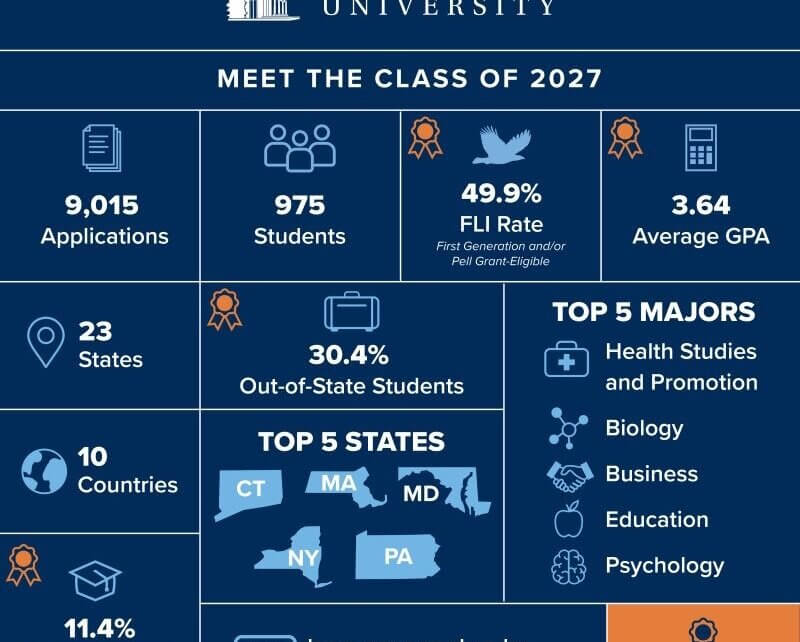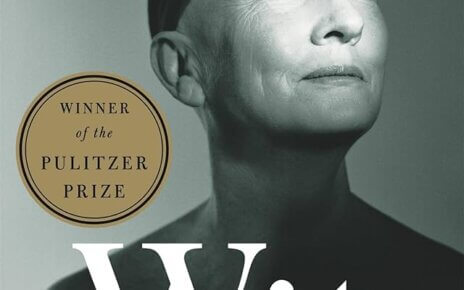Monmouth University’s Class of 2027 has qualified as being the most academically prepared class in the University’s 90-year history, flaunting the most noteworthy grade point average of any incoming first-year cohort at 3.64. This class has also exceeded previous benchmarks of out-of-state and Honors School enrollments while simultaneously boasting a record number of first-generation and low-income students.
This approaching first-year class was chosen out of over 9,000 applications, with a record-setting 11.4 percent of attending freshmen joining the University’s Honors School, a subdivision of successful, high-capacity, and exceptionally energetic students. The top five majors of the incoming class are Health Studies and Promotion, Biology, Business, Education, and Psychology.
Adding to the list, the Class of 2027 has likewise recorded the highest number of acceptances from out-of-state students. Over 30 percent of the class comes from out of state, with students hailing from 23 other states and ten countries. Thirty-two different languages are spoken by 245 multilingual students, with over 29 percent of the class identifying as ethnically or racially diverse. The number of first-generation and low-income communities is also outstanding; almost 50 percent of all students in this class are considered FLI students.
Victoria Bobik, Assistant Vice President for Undergraduate Admission, has worked with the University since 2005 and is ecstatic with the numbers. According to Bobik, her department is gratified that these talented students are choosing to attend the University. She explained, “I think this speaks to the strength of our programs, the quality of our teaching, and the overall confidence students have in the quality of a Monmouth University education.”
She continues by highlighting that students are bringing all kinds of strengths and interests to the Monmouth community, which thus enriches the conversation that happens inside the classrooms. She speaks on behalf of Admissions, mentioning that they are very excited to see what this class will achieve as Monmouth students. “Given the challenges these students have faced in the past few years during high school, their accomplishments are especially remarkable, and I think bodes well for their ability to continue excelling in their academic endeavors here.”
Bobik points out that, during the application process, students are asked to present their academic and personal strengths. From here, Admission evaluates the applicant’s grades, strengths of the curriculum, and trends in success over time, etc. Another thing that plays a huge part in acceptance is the recommendations from the individuals who know their academic accomplishments. After this step, Admission “evaluate[s] students’ ability to communicate, through a writing sample.” Once that part is finished, all of these pieces enable Admission to understand students’ ability to succeed and prosper academically at Monmouth.
What’s similar to this groundbreaking record, as per Bobik, is that the Monmouth community always brings different skills to the table. She mentions academic strengths and experiences have increased over the past few years. She said, “Each year, it is a great pleasure to have worked with such accomplished students in helping them find Monmouth University.” Another thing she mentioned is how this class was able to make the most out of their years while being disrupted significantly by the pandemic. She said, “But what these students have proven is that they have the resilience, determination, and strength to overcome it.”
John Morano, Professor of Journalism in the Department of Communication, teaches some of the freshmen and enjoys educating this class. In his Intro to Journalism course, about a third of students are freshmen, and Morano sees them as being very engaged, inquisitive, and having a knack for asking very good questions. Sometimes the questions are so great that he doesn’t get through his original lessons; their questions end up directing the lessons. “They encourage me,” concluded Morano.
Overall, Bobik believes that this alone sets a great example for future incoming and current classes, who may be able to learn from seeing the Class of 2027. The main piece of advice that she gives to these students is to seize the opportunities that they are offered, mentioning that a student from some years ago described Monmouth as an “opportunities machine.” She weighs heavily on encouraging students to take advantage of the resources here on campus. She emphasized, “Grab the opportunities you see before you. Your experience will be richer for them. And these opportunities will take you further than you can imagine.”



